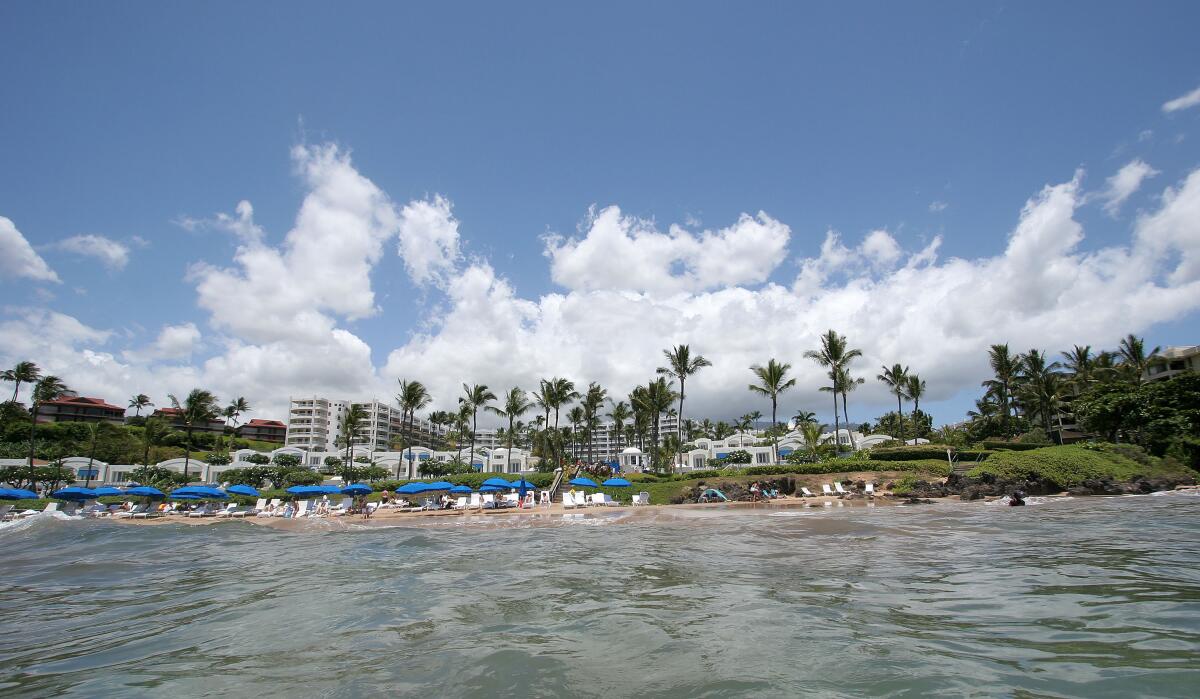Editorial: California lawmakers wine and dine with lobbyists in Maui. Why is this legal?

- Share via
A dozen state lawmakers are in Maui this week for one of the most unsavory traditions in California politics: a five-day stay at a luxury resort where, far from their constituents and the pesky political press corps, legislators rub shoulders with lobbyists and corporate executives in a tropical playland.
Poolside drinks, golf rounds and snorkeling excursions aren’t the only way they pass their time at this annual conference. They also talk about policy. Companies that pay between $9,000 and $30,000 each to sponsor the event get to pitch ideas to lawmakers who will be back at the Capitol in January to write bills and vote on legislation. Legislation, of course, that could help or hurt the very companies and organizations that sponsor the trip.
Conference organizers would not disclose specific companies that paid for the event and sent representatives this year, but said they come from the pharmaceutical, energy, software, cable and telecom industries, as well as the prison guards’ union. Discussions are focused on climate policy and the COVID-19 pandemic, topics that surely interest many Californians who are barred from this exclusive event.
Nor would they identify which lawmakers are discussing these important topics this week at the beachfront Fairmont Kea Lani resort. Lawmakers aren’t saying much either. While California officials who attended the U.N. climate conference in Scotland and President Biden’s bill signing in Washington this week flooded their social media feeds with selfies from the events, we haven’t seen anything similar from the state senators and Assembly members sipping mai tais poolside with Big Oil and Big Pharma lobbyists.
Politicians must disclose the trip when they file their annual statements of economic interest next year, though most voters will never see this document. Lawmakers who participated in the Maui conference last year reported it as a gift of about $3,500 from the Independent Voter Project — a nonprofit that promotes top-two primaries (like California’s), ranked-choice voting and other electoral changes. Although state law caps gifts to government officials at $520, a loophole eliminates the cap for trips with a “legislative or governmental purpose” that are paid for by a nonprofit organization.
And so, even though it reeks of backroom dealing and pay-to-play politics, the lawmakers’ annual Maui trip is perfectly legal. Politicians get a free vacation. Sponsors get face time with powerful decision-makers. And the Independent Voter Project raises money to pay for operation of its website, Executive Director Dan Howle said.
The conference typically attracts a mix of Republicans and moderate Democrats, a key bloc of votes in California’s overwhelmingly Democratic Legislature. Assemblywoman Blanca Rubio (D-Baldwin Park), who leads a loose caucus of centrist Democrats, went on the trip last year, as did state Sen. Susan Rubio (D-Baldwin Park), who is her sister.
Among the other attendees last year were Southern California Assembly members Patrick O’Donnell (D-Long Beach), Mike Gipson (D-Carson), Wendy Carrillo (D-Los Angeles), Tom Daly (D-Anaheim), Chad Mayes (I-Rancho Mirage), Jose Medina (D-Riverside) and state Senate Minority Leader Scott Wilk (R-Saugus).
O’Donnell said he is there again this year “to discuss many of the pressing issues that we, as California lawmakers, will have to take action on.”
Other legislators dodged questions about whether they’re at the conference, emblematic of the routine cat-and-mouse game that takes place each year as journalists try to find out who’s on the junket. (See last year’s painful explanation from Carrillo, who said she traveled to Maui amid California’s pandemic lockdown “to find solutions on how we can safely live through COVID-19.”)
It’s bad enough that elected officials are discussing public policy in this most un-public forum. That many are so squirrelly about their attendance only makes it look worse. Ideally, the loophole that allows this practice to continue should be closed. But since that would take an act by legislators, we won’t hold our breath.
At the very least, those who participate should be upfront with their constituents and share their whereabouts, along with an agenda showing whom they met with and what they discussed. No need to hunt for a postcard and a stamp. Just post it on social media so voters at home can see your #IslandStyle.
More to Read
A cure for the common opinion
Get thought-provoking perspectives with our weekly newsletter.
You may occasionally receive promotional content from the Los Angeles Times.










